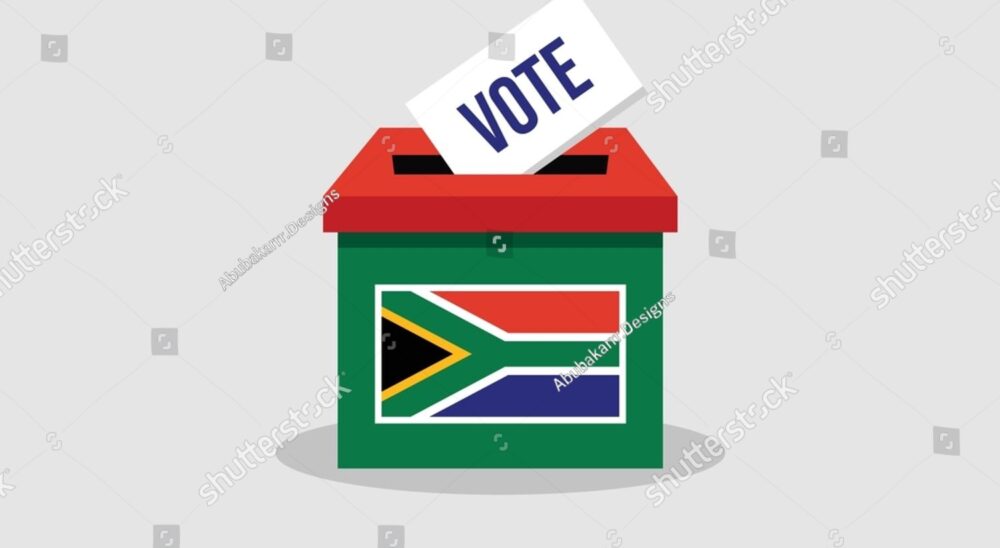
by Zara Schroeder, Scott Timcke, and Sandra Makumbirofa
On 16 May 2024, researchers from Research ICT Africa (RIA) participated in the IEC Briefing of Domestic Observers for 2024 National and Provincial Elections, funded by the UNDP. The IEC is a South African constitutional body that manages national, provincial and municipal elections in South Africa. It is an independent body from the government of South Africa.
This briefing aligns with the IDRC funded project, Resisting information disorder in the Global South, led by Prof. Herman Wasserman at Stellenbosch University, especially considering that misinformation can shape the electoral process. Researchers Dr. Scott Timcke, Dr. Sandra Makumbirofa and Zara Schroeder attended this briefing to learn more about election observation in the upcoming 2024 elections. The IEC has appointed Scott Timcke as an Election Observer. RIA was also interested to learn how the IEC planned to address the issues around information disorder like AI powered image manipulation.
Elections are the core of democracy. They provide citizens with the fundamental right to select the leaders they want, which ultimately serves as a means to shape the future trajectory of their country. In relation to these elections the Observers play a crucial role in ensuring that the elections are conducted in a manner that is free, fair and transparent. The briefing session entailed an in-depth discussion around integrity and transparency on the election day as well as throughout the election process.
The concepts of integrity and transparency are at the core of the ethos that the Observers should abide by. The IEC definitions of free and fair pertain to notions of processes, freedom and opportunity for all citizens to vote. The Observers’ role is encompassed by assessing whether the election process is free and fair. Furthermore, Observers are responsible for reassuring voters and political parties of the credibility of the election. The reason for this is that the assessment comes before the reassurance. The May 2024 National and Provincial Elections are especially significant, as it commemorates 30 years of democracy in South Africa.
It is expected that these elections will be pivotal for South Africa’s political development, since it can measure progress made since the end of apartheid as well as the challenges that remain. Beyond this, these elections serve as a barometer of South Africa’s dedication to equality and democracy. These elections symbolise the significance of social cohesion, responsible governance and sustainable development for the country. Decisions that are made during elections ultimately impact every aspect of society.
Misinformation and disinformation are often closely associated with elections, with the rise of AI, the proliferation of both of these issues has increased around the world. The African Union has considered how it plans to manage elections in the context of AI. This is especially necessary since many political parties leverage social media to drive their political agenda and push certain narratives and promises to the public. Even South Africa has had instances of disinformation during elections where the 2017 Bell Pottinger scandal elicited a great deal of attention as it aimed to exacerbate racial division in South Africa through social media. Since this incident, there have been other instances of artificial disinformation and digital misinformation. RIA researchers expect that the proliferation of generative AI systems will lower the cost to make and disseminate persuasive political misinformation.
It was clear from the briefing session that attention to AI is on the horizon of the IEC, but they do not yet have a clear and comprehensive strategy to address the impact of this set of technologies. During his presentation, Michael Hendrickse, the IEC Provincial Electoral Office, said that “Our laws were written in the 1990s; we need to get better at understanding the digital landscape.” It appeared that the IEC are apprehensive about introducing AI into election management due to concerns around policing, governance and management of transparency, fairness, and integrity.
These reasonable concerns present an opportunity for research groups like Resisting information disorder in the Global South to provide guidelines and strategy guides for election management bodies so that they are better positioned to evaluate how AI systems can both drive and check misinformation practices that target the electoral process.



